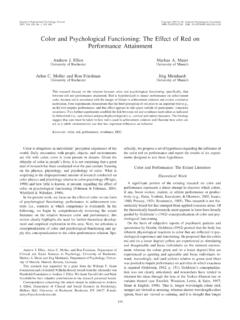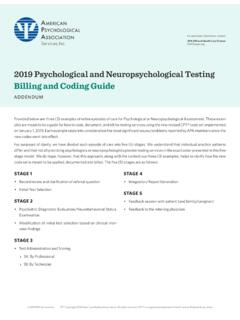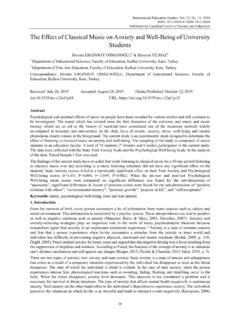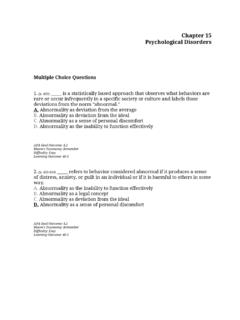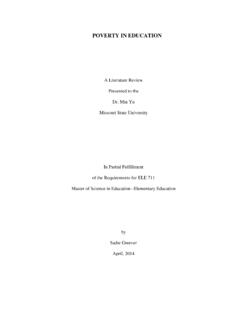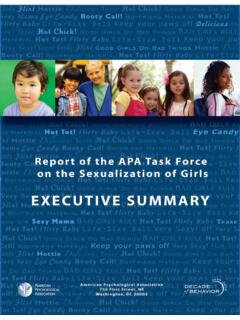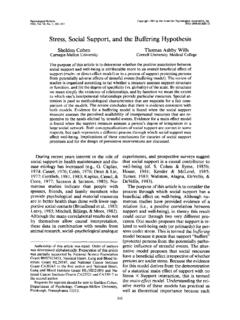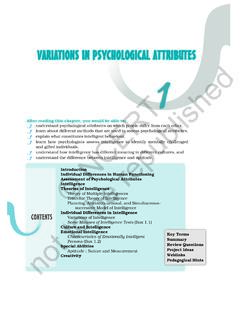Transcription of Counting Blessings Versus Burdens: An Experimental ...
1 Counting Blessings Versus Burdens: An Experimental Investigation ofGratitude and Subjective Well-Being in Daily LifeRobert A. EmmonsUniversity of California, DavisMichael E. McCulloughUniversity of MiamiThe effect of a grateful outlook on psychological and physical well-being was examined. In Studies 1and 2, participants were randomly assigned to 1 of 3 Experimental conditions (hassles, gratitude listing,and either neutral life events or social comparison); they then kept weekly (Study 1) or daily (Study 2)records of their moods, coping behaviors, health behaviors, physical symptoms, and overall life apprais-als. In a 3rd study, persons with neuromuscular disease were randomly assigned to either the gratitudecondition or to a control condition.
2 The gratitude-outlook groups exhibited heightened well-being acrossseveral, though not all, of the outcome measures across the 3 studies, relative to the comparison effect on positive affect appeared to be the most robust finding. Results suggest that a consciousfocus on Blessings may have emotional and interpersonal on your present Blessings , on which every man has many, noton your past misfortunes, of which all men have some. Charles Dickens (M. Dickens, 1897, p. 45)The construct of gratitude has inspired considerable interest inthe general public. The prevalence of books targeted to generalaudiences on the topic (Breathnach, 1996; Hay, 1996; Miller,1995; Ryan, 1999; Steindl-Rast, 1984; Turner, 1998; Van Kaam &Muto, 1993) testify to this concept s widespread appeal.
3 Followinga similar format, these popular books generally consist of reflec-tions on the value of gratefulness, along with strategies for culti-vating an attitude of gratitude. The essential message of thesevolumes is that a life oriented around gratefulness is the panaceafor insatiable yearnings and life s ills. Grateful responses to life,we are told, can lead to peace of mind, happiness, physical health,and deeper, more satisfying personal relationships. Although in-tuitively compelling, many of the general claims in popular booksconcerning the power of a grateful lifestyle are speculative and asyet scientifically untested. In one popular book on gratitude, forinstance, the author asserts that Whatever we are waiting for peace of mind, contentment, grace.
4 Itwill surely come to us, butonly when we are ready to receive it with an open and gratefulheart (Breathnach, 1996).Gratitude has also had a long past in the history of ideas. Acrosscultures and time, experiences and expressions of gratitude havebeen treated as both basic and desirable aspects of human person-ality and social life. For example, gratitude is a highly prizedhuman disposition in Jewish, Christian, Muslim, Buddhist, andHindu thought (Carman & Streng, 1989). Indeed, the consensusamong the world s religious and ethical writers is that people aremorally obligated to feel and express gratitude in response toreceived benefits. Despite such widespread exhortations, the con-tribution of gratitude to health, well-being, and overall positivefunctioning remains speculative and without rigorous empiricalconfirmation.
5 Contemporary research on gratitude is still in afledgling state (Emmons & McCullough, in press; McCullough,Emmons, & Tsang, 2002). Our primary purpose in this set ofstudies is to examine the influence of grateful thinking on psycho-logical well-being in daily life and thereby put to the test popularand classical assumptions concerning the benefits of the Meaning of GratitudeGratitude defies easy classification. It has been conceptualizedas an emotion, an attitude, a moral virtue, a habit, a personalitytrait, or a coping response. The wordgratitudeis derived from theLatin rootgratia, meaning grace, graciousness, or gratefulness. Allderivatives from this Latin root have to do with kindness, gener-ousness, gifts, the beauty of giving and receiving, or gettingsomething for nothing (Pruyser, 1976, p.)
6 69). The object ofgratitude is other-directed persons, as well as to impersonal(nature) or nonhuman sources ( , God, animals, the cosmos;Solomon, 1977; Teigen, 1997). Although a variety of life experi-ences can elicit feelings of gratitude, prototypically gratitude stemsfrom the perception of a positive personal outcome, not necessarilydeserved or earned, that is due to the actions of another has been defined as the willingness to recognize theunearned increments of value in one s experience (Bertocci &Millard, 1963, p. 389), and an estimate of gain coupled with thejudgment that someone else is responsible for that gain (Solomon,Robert A. Emmons, Department of Psychology, University of Califor-nia, Davis; Michael E.
7 McCullough, Department of Psychology, Universityof research was supported by a generous grant from The JohnTempleton Foundation. We are grateful to Michelle Vu and Lisa Krause fortheir assistance in data preparation and data entry, and to Jo-Ann Tsang forher helpful comments on a draft of this concerning this article should be addressed to RobertA. Emmons, Department of Psychology, University of California, OneShields Avenue, Davis, California 95616. E-mail: of Personality and Social PsychologyCopyright 2003 by the American psychological Association, , Vol. 84, No. 2, 377 3890022-3514/03/$ DOI: , p. 316). The benefit, gift, or personal gain might be materialor nonmaterial ( , emotional or spiritual).
8 As an emotion, gratitude is an attribution-dependent state(Weiner, 1985) that results from a two-step cognitive process: (a)recognizing that one has obtained a positive outcome, and (b)recognizing that there is an external source for this positive out-come. Lazarus and Lazarus (1994) argued that gratitude is one ofthe empathic emotions whose roots lie in the capacity to empa-thize with others. The core relational theme associated with grat-itude is recognition or appreciation of an altruistic gift. Gratitudeis a complex state that belongs to the category of affective cognitive conditions (Clore, Ortony, & Foss, 1987) in which bothaffect and cognition are predominant-meaning components of , Happiness, and Well-Being:Mechanisms of AssociationThere are reasons to believe that experiences of gratitude mightbe associated perhaps even in a causal fashion with happinessand well-being.
9 Researchers, writers, and practitioners have allspeculated that gratitude possesses happiness-bestowing proper-ties. Chesterton (1924) contended that gratitude produced .. themost purely joyful moments that have been known to man ( ). Several theorists and researchers ( , Lazarus & Lazarus,1994; Mayer, Salovey, Gomberg-Kaufman, & Blainey, 1991; Or-tony, Clore, & Collins, 1986; Weiner, 1985) have noted thatgratitude typically has a positive emotional research suggests that gratitude is a moderately pleasantand activating emotion. Research has shown that gratitude is apleasant state and is linked with positive emotions including con-tentment (Walker & Pitts, 1998), happiness, pride, and hope(Overwalle, Mervielde, & De Schuyter, 1995).
10 In research on thescaling of emotion terms, gratitude tends to load on pleasantnessand activation factors (Mayer et al., 1991; Reisenzein, 1994). In anempirically derived taxonomy of emotion terms, gratitude wasclustered in a category of positive, interpersonal feelings thatincluded admiration, respect, trust and regard (Storm & Storm,1987). In similarity judgments of emotions, thankfulness is ratedas highly similar to joy and contentment, and as highly dissimilarto contempt, hate, and jealousy (Schimmack & Reisenzein, 1997).Gratitude was 1 of 50 emotion terms included in Davitz s (1969)study of the structure of emotional meaning. Forty subjects ratedthe relevance of over 500 descriptive statements designed to cap-ture various elements of emotional experiences.








